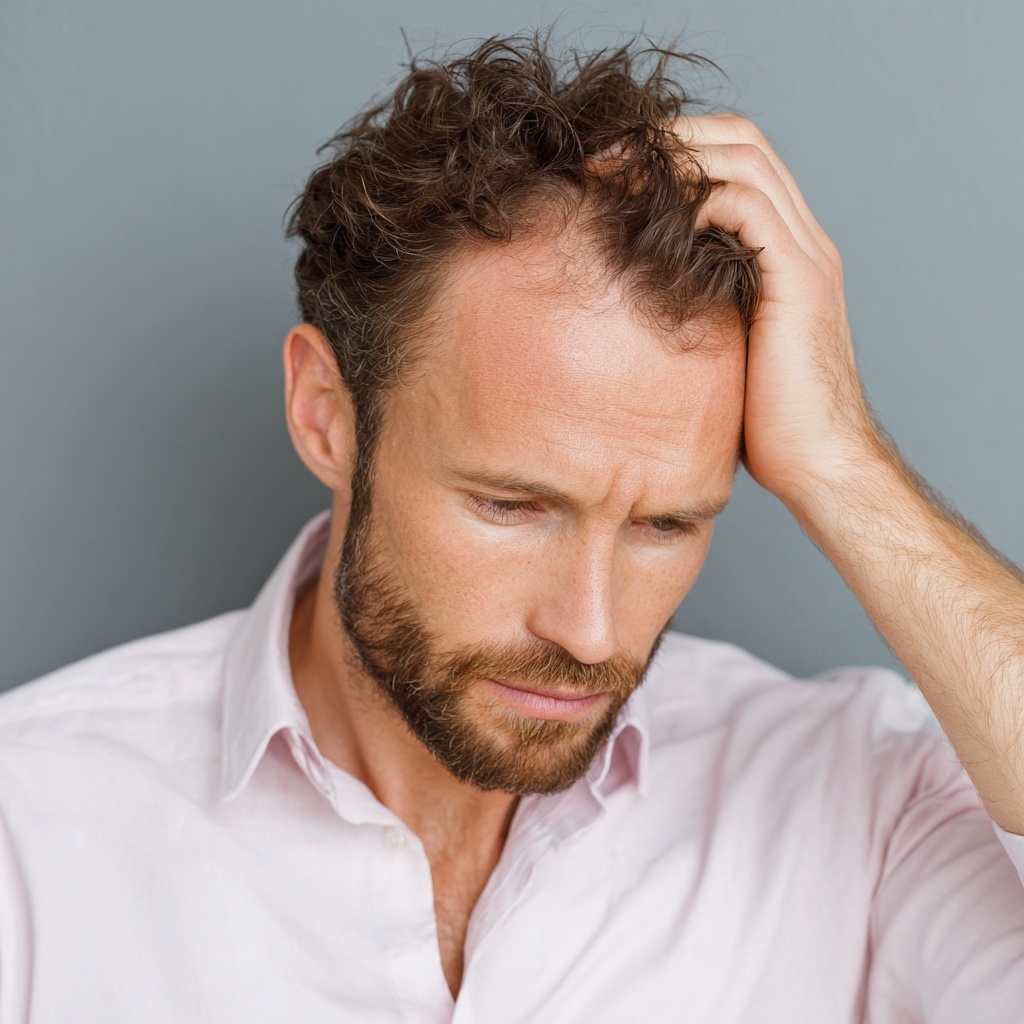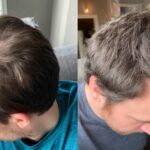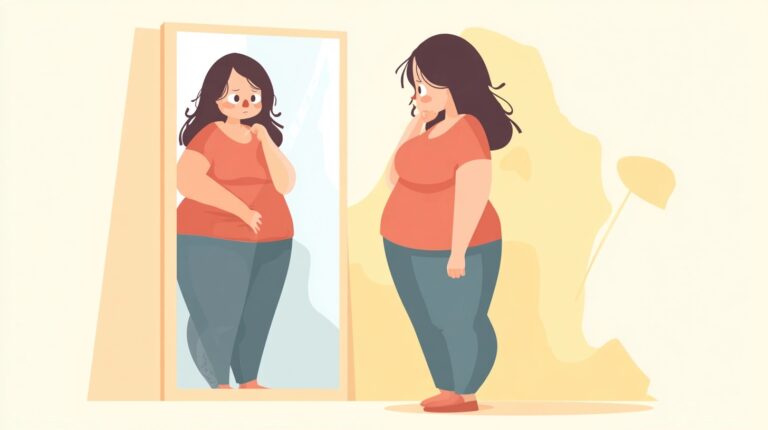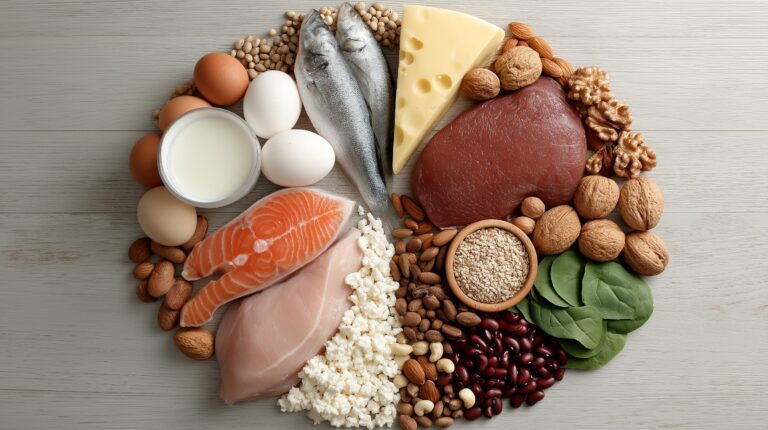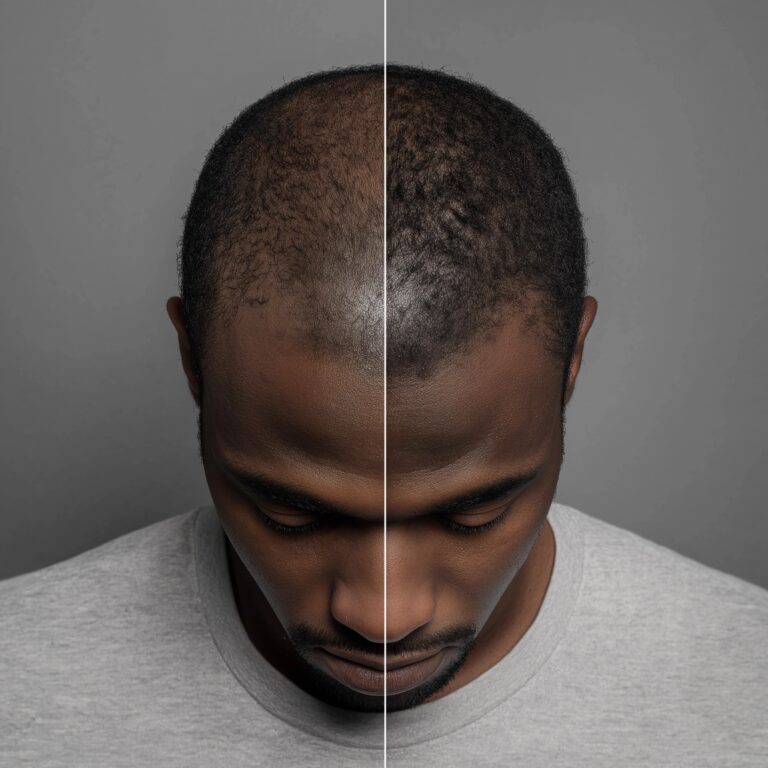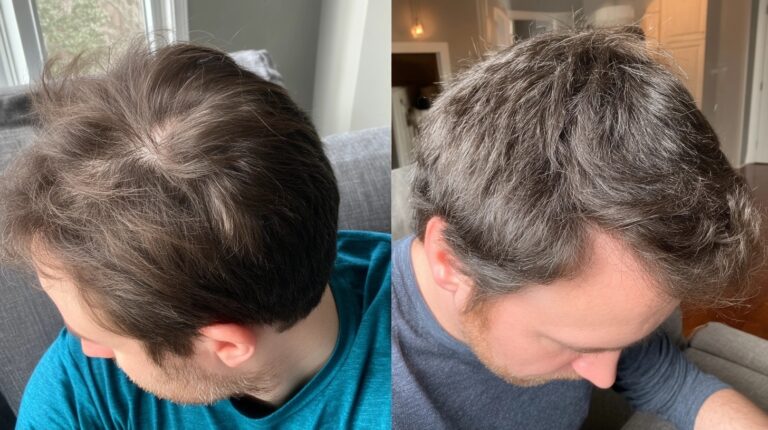Did you know that 30 to 50% of men over 50 experience hair loss due to Male Pattern Baldness (MPB) or Male Androgenetic Alopecia (MAA)?1 While ageing may be a factor, genetics and hormonal shifts might also play a considerable role.3 Here are eight essential strategies to help you deal with your hair loss issues. Keep reading to learn more!
Strategy 1: Understand Your Hair Growth Cycle
Through a multi-phase growth cycle, hair from your scalp is shed at approximately 100 to 200 follicles per day and grows at a rate of about 0.35 mm per day, 1 cm per month, or 15 cm per year:2
Hair Growth Cycle Phase(s) | Duration | % of Hairs in that Phase |
Anagen (Growth Phase) | Several years | ~90% |
Catagen (Transition Phase) | Several weeks | ~1 to 2% |
Telogen (Resting Phase) | A variable amount of time, depending on the location of the hair | ~10 to 14% |
Table showing hair growth cycle phases, duration, and percentage of hairs in that phase.
The anagen phase is the active growth phase. Hair follicles then go through a short transition (catagen) phase before entering the resting (telogen) phase. Hair loss occurs when the normal hair growth cycle is disrupted or when the hair follicle is damaged. This might happen due to various factors.2
Strategy 2: Understand the Main Causes of Male Hair Loss
Androgenic hair loss in men is primarily influenced by genetic and hormonal factors. Here’s a breakdown of the main causes:
- Genetics: The most significant factor in MAA seems to be genetics. If there are close family members who have experienced male pattern baldness, there’s a higher likelihood that it will affect other family members too. The condition may be linked to genes affecting hair follicle sensitivity to dihydrotestosterone (DHT).3
- Hormones: The hormone DHT, a derivative of testosterone, might be closely linked to MAA. DHT may cause the hair follicles to shrink, reducing the lifespan of each hair and eventually leading to thinner coverage. The level of DHT is likely to be determined by genetic sensitivity more than the actual hormone level in the blood.3
- Age: Naturally, age might play a role. Most men start to notice hair thinning by their 30s or 40s, but it might start as early as the late teens or early 20s. The progression and degree of baldness might increase with age.1
Understanding these factors could potentially help in managing expectations and exploring treatment or management options. Need help? Contact your Aussie-based hair loss expert today!
Strategy 3: Use Clinically-Proven Treatments
Medical research has shown that some proven treatments might help manage or slow hair loss effectively. The two most established are:
- A widely available over-the-counter topical solution that helps keep hair follicles active and growing.4
- A prescription oral medication that works by targeting hormones involved in pattern hair loss.5
Some newer treatment approaches showing potential in early research include light-based therapies and treatments using the body’s own growth factors, though more studies are still needed to fully understand their long-term effectiveness and safety.6,7
Strategy 4: Eat a Hair-Healthy Diet
A 2018 study found that men following a Mediterranean-style diet high in raw vegetables and fresh herbs had lower risk of androgenetic alopecia compared to those who didn’t.8 Hence, following such a dietary pattern might help in preventing hair loss.
Just like the rest of your body, your hair needs a variety of nutrients from a balanced diet to grow and thrive. In fact, deficiencies in nutrients like iron, niacin, fatty acids, vitamin D, zinc, and protein may significantly contribute to hair thinning and loss.9
The key elements of a balanced diet, which serve as the foundation for a diet beneficial to hair health too, include:10
- Lean proteins (eggs, fish, legumes, poultry)
- Leafy greens and colorful vegetables
- Nuts and seeds
- Whole grains
- Healthy fats (olive oil, avocados, fatty fish)
Strategy 5: Cautiously Consider Targeted Supplements
In addition to a hair-healthy diet, supplements are believed to provide follicles with the nutrients they need for healthy growth. However, limited information exists on the effects of nutrient supplements on hair growth without deficiency. At this time, there are no definitive answers, so each patient must be considered individually.9
Strategy 6: Manage Your Stress
High levels of emotional or physiological stress may contribute to hair loss. A stressful event like surgery, rapid weight loss or a death in the family might trigger telogen effluvium (TE) or club hair, where large numbers of follicles prematurely enter the shedding phase.11
I have telogen effluvium (TE), can I speed up my hair growth?
Unfortunately, there’s no magic solution to make your hair grow faster. Similarly, there are no proven treatments to prevent or stop temporary TE once it starts.11
What to do if you think you’re experiencing telogen effluvium (TE):11
- Stay calm and be patient: Temporary hair loss can be distressing, but it’s important to remember that it’s a condition that might resolve on its own.
- Minimise triggers: While major life stressors, surgery, and illness are sometimes unavoidable, try to maintain a stable weight, avoid frequent changes in birth control methods, and ensure your thyroid is functioning correctly.
- Seek professional advice if needed: If your shedding persists beyond 6 months or your hair doesn’t regrow as expected, consult a dermatologist to rule out other potential causes of hair loss.
Strategy 7: Try Scalp Massage
Scalp massage may be a free, easy way to encourage hair growth by increasing blood flow to follicles. One study found that men who received 4 minutes of daily scalp massage had thicker hair after 24 weeks compared to a control group.12
Use the tips of your fingers to gently massage your scalp in a circular motion for a few minutes each day. You may also want to try a handheld massager or vibrating brush.
Strategy 8: Don’t Do It Alone!
Worried about sudden hair loss or not seeing results from over-the-counter treatments after several months? Your trusted Australian-based health experts are here to provide personalised advice and an appropriate treatment plan.
Wrapping It Up!
With a combination of proven treatments, a healthy lifestyle and consistency, it is possible to manage hair loss. By following these 8 science-backed tips, you might be able to keep your hair looking its best for years to come. Seeking for more trusted help? Start here!
References:
- Rhodes T, Girman CJ, Savin RC, et al. Prevalence of male pattern hair loss in 18-49 year old men. Dermatologic Surgery: Official Publication for American Society for Dermatologic Surgery [et Al]. 1998;24(12):1330-1332. doi:https://doi.org/10.1111/j.1524-4725.1998.tb00009.x
- Hoover E, Alhajj M, Flores JL. Physiology, Hair. PubMed. Published 2020. https://www.ncbi.nlm.nih.gov/books/NBK499948/
- Cranwell W, Sinclair R. Male Androgenetic Alopecia. Nih.gov. Published February 29, 2016. https://www.ncbi.nlm.nih.gov/books/NBK278957/
- Olsen EA, Dunlap FE, Funicella T, et al. A randomized clinical trial of 5% topical minoxidil versus 2% topical minoxidil and placebo in the treatment of androgenetic alopecia in men. Journal of the American Academy of Dermatology. 2002;47(3):377-385. doi:https://doi.org/10.1067/mjd.2002.124088
- Drake L, Hordinsky M, Fiedler V, et al. The effects of finasteride on scalp skin and serum androgen levels in men with androgenetic alopecia. Journal of the American Academy of Dermatology. 1999;41(4):550-554. https://pubmed.ncbi.nlm.nih.gov/10495374/
- 8.Lanzafame RJ, Blanche RR, Bodian AB, Chiacchierini RP, Fernandez-Obregon A, Kazmirek ER. The growth of human scalp hair mediated by visible red light laser and LED sources in males. Lasers in Surgery and Medicine. 2013;45(8):487-495. doi:https://doi.org/10.1002/lsm.22173
- Gamret AC, Fertig RM, Klingbeil KD, et al. Carcinosarcoma of the hand. Dermatology online journal. 2019;25(6):13030/qt81m9c97r. https://pubmed.ncbi.nlm.nih.gov/31329397/
- Fortes C, Mastroeni S, Mannooranparampil T, Abeni D, Panebianco A. Mediterranean diet: fresh herbs and fresh vegetables decrease the risk of Androgenetic Alopecia in males. Archives of Dermatological Research. 2017;310(1):71-76. doi:https://doi.org/10.1007/s00403-017-1799-z
- Guo EL, Katta R. Diet and hair loss: effects of nutrient deficiency and supplement use. Dermatology practical & conceptual. 2017;7(1):1-10. doi:https://doi.org/10.5826/dpc.0701a01
- Health Direct. A balanced diet. Healthdirect.gov.au. Published April 10, 2018. https://www.healthdirect.gov.au/balanced-diet
- IS YOUR HAIR SUDDENLY SHEDDING like CRAZY? YOU MAY HAVE a CONDITION CALLED TELOGEN EFFLUVIUM. Accessed December 3, 2024. https://www.massgeneral.org/assets/mgh/pdf/dermatology/temporary-hairloss.pdf
- Koyama T, Kobayashi K, Hama T, Murakami K, Ogawa R. Standardized Scalp Massage Results in Increased Hair Thickness by Inducing Stretching Forces to Dermal Papilla Cells in the Subcutaneous Tissue. Eplasty. 2016;16:e8. https://pmc.ncbi.nlm.nih.gov/articles/PMC4740347/

